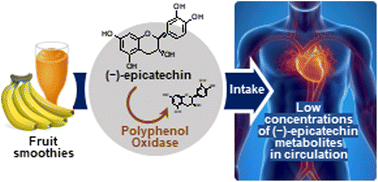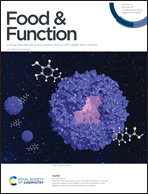Impact of polyphenol oxidase on the bioavailability of flavan-3-ols in fruit smoothies: a controlled, single blinded, cross-over study†
Abstract
Flavan-3-ols are bioactive compounds found in a variety of fruits and vegetables (F&V) that have been linked to positive health benefits. Increasing habitual flavan-3-ol intake is challenged by the generally low consumption of F&V. While smoothies are a commonly endorsed, consumer-accepted means to increase the daily intake of these important foods, fruits used for smoothie preparation can have a high polyphenol oxidase (PPO) activity and thus potentially affect the content and bioavailability of flavan-3-ols. To assess whether or not consuming freshly prepared smoothies made with different PPO-containing fruit impacts the bioavailability of the flavan-3-ols, a controlled, single blinded and cross-over study was conducted in healthy men (n = 8) who consumed a flavan-3-ol-containing banana-based smoothie (high-PPO drink), a flavan-3-ol-containing mixed berry smoothie (low-PPO drink) and flavan-3-ols in a capsule format (control). The peak plasma concentration (Cmax) of flavan-3-ol metabolites after capsule intake was 680 ± 78 nmol L−1, which was similar to the levels detected after the intake of the low PPO drink. In contrast, the intake of the high PPO drink resulted in a Cmax of 96 ± 47 nmol L−1, 84% lower than that obtained after capsule intake. In a subsequent study (n = 11), flavan-3-ols were co-ingested with a high-PPO banana drink but contact prior to intake was prevented. In this context, plasma flavan-3-ol levels were still reduced, suggesting an effect possibly related to post-ingestion PPO activity degrading flavan-3-ols in the stomach. There was a substantial range in the PPO activity detected in 18 different fruits, vegetables and plant-derived dietary products. In conclusion, bioavailability of flavan-3-ols, and most likely other dietary polyphenol bioactives, can be reduced substantially by the co-ingestion of high PPO-containing products, the implications of which are of importance for dietary advice and food preparation both at home and in industrial settings.

- This article is part of the themed collection: Food & Function HOT Articles 2023


 Please wait while we load your content...
Please wait while we load your content...